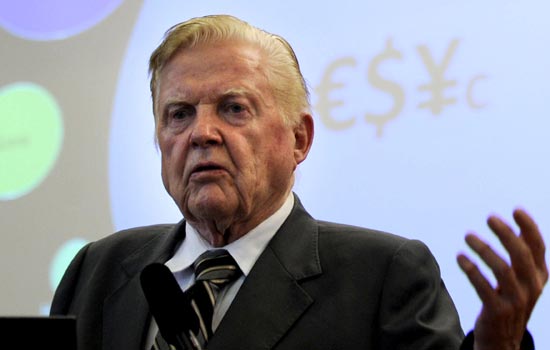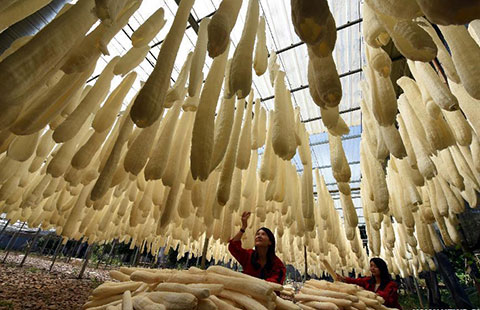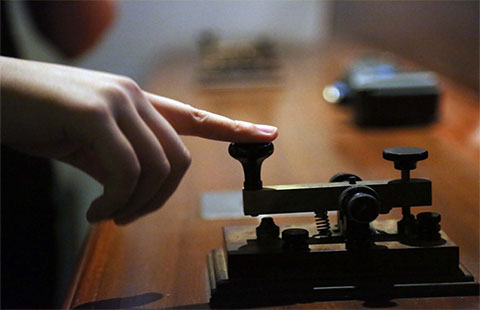Policy shifts 'can maintain growth'
By Shan Juan in Nanchang, Jiangxi (China Daily) Updated: 2012-06-12 09:07

Mundell says higher domestic expenditure holds key to expansion
Nobel Prize-winning economist Robert Mundell, also known as the "father of the euro", has called on China to boost domestic expenditure and consumption to guarantee continued growth of the world's second-largest economy for at least another 30 years.
While Europe is struggling to prevent the euro from unraveling, China should "get the economy back to a growth rate of 8, 9 or 10 percent", he said in an exclusive interview with China Daily.
To achieve that goal, he suggested that China allow further monetary expansion and pursue policy easing.
He said he appreciated the latest interest rate cut, announced by China's central bank on Thursday, and he also expected further reductions in banks' reserve requirements ratios.
China lowered interest rates by 25 basis points, the first cut in more than three years, to spur growth.
Given that the yuan is not convertible, the rate cut won't have a global impact, Mundell pointed out.
"Monetary policy remains tight, but as long as China loosens reserve requirements further this year, the economy will continue to grow at a good pace," he said.
GDP grew 8.1 percent in the first quarter of this year, the slowest pace in nearly three years.
The government has reduced its economic growth target for this year to just 7.5 percent, down from actual growth of 9.2 percent last year and 10.4 percent in 2010.
Since the fourth quarter of last year, China has cut banks' reserve requirement ratios three times to inject more liquidity into the market by allowing banks to lend more.
Mundell forecast China's GDP would maintain continued growth for at least the next 30 years - not at an annual rate of 10 percent, but at least 7 percent.
He said China has done wonders in trade but the world economy is slowing down, particularly in Europe.
"So I think China could trade more with other emerging market countries like India and Brazil," he said.
China aims for growth of about 10 percent this year in foreign trade, amid a lackluster external market. Foreign trade grew 22.5 percent last year.
China's foreign trade rose 14.1 percent year-on-year to $343.58 billion in May, rebounding from 2.7 percent registered in April, the General Administration of Customs said on Sunday.
The figure essentially matched the monthly trade record set last November, when foreign trade amounted to $334.11 billion, the customs office said.
As China has become the world's second-largest trading economy, the yuan is more and more useful globally, Mundell said.
But there are still barriers to the yuan becoming a global currency, he noted.
First, he said, in his view, the yuan is not convertible. Second, China's external accounts have mainly run at a surplus.
Recession warning
Mundell went on to warn of a looming second global recession, as the economy has become turbulent worldwide - not just in Europe, but in China, where growth is decelerating.
"I am worried about that in the next year, particularly because (US President Barack) Obama seems to want to raise taxes tremendously at the end of 2013 when the Bush/Obama tax cuts expire," he said.
"Then there will be a big fiscal drag, which would bring the US and the world economy into a recession," he warned.
But he added that it didn't have to be that way, as Obama might be replaced by Republican presidential candidate Mitt Romney, who would introduce corporate tax cuts to avert the crisis.
After all, "nobody wants four more years of stagnation", he said.
Asked about Europe's sovereign debt crisis and the outlook for the euro, Mundell seemed optimistic, saying that it was actually not a major crisis.
"Europe has obviously got a lot of problems, but a solution will be found," he noted.
"Do exactly what the Federal Reserve did in the US and the problem will be solved," he said.
"The euro won't collapse," he forecast.
According to Mundell, it is pretty clear that Europe needs adjustments, including the issue of euro bonds and bills, unifying the European banking system to making it more efficient and gaining more support from the European Central Bank for weak markets, like Spain.
On Saturday, Spain agreed to a bailout for its banks under an aid package of $125 billion.
shanjuan@chinadaily.com.cn
- China official manufacturing PMI falls to 50.0 in July, below forecasts
- China plans urban utilities tunnels
- Chinese drone maker spreads wings in Latin America
- China pumps money into rejuvenating northeast
- China's leaders focus on economic growth, risks
- China Southern Airlines launches China-Vietnam route
- China to build unified resource trading platform by 2017
- China aims to be 'most reliable partner' for Africa's industrialization

















